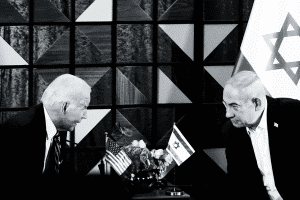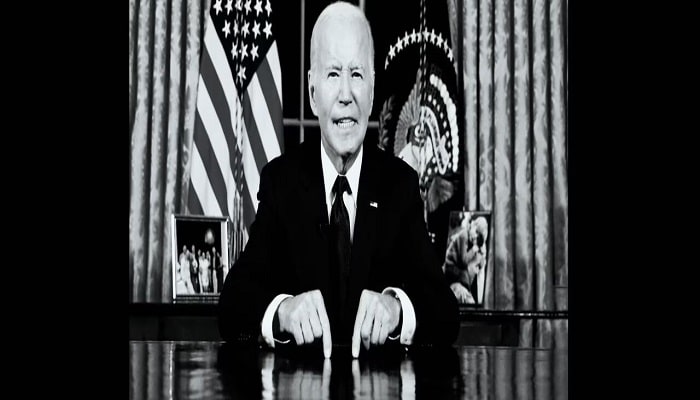PNN – The Financial Times newspaper wrote: US President Joe Biden has inadvertently been caught in one of the world’s biggest unsolvable problems, which has turned into a diplomatic quagmire for regional goals.
According to Pakistan News Network’s report on Saturday, this newspaper wrote: Biden tried to avoid getting caught in such a quagmire, but due to the attacks of October 7 by Hamas to the south of the occupied territories and the retaliatory and brutal action of the Zionist regime against Gaza, it was not possible to escape from it.
The Financial Times wrote: When Biden embarked on his first trip as president to the Middle East last year, he praised the fact that it was the first time since the attacks of September 11, 2001 that a US president had gone on combat missions without his troops present.

Biden also sought to restore Washington’s ties with its traditional partners, promising Arab leaders at a meeting in Saudi Arabia that his administration would rebuild trust and deliver “real results.” He added: We will act in the framework of the Middle East as it is today: a more united region than it has been in the past years.
Last week, Biden made his second presidential trip to the Middle East. The destination of his trip was Tel Aviv, which is damaged by war and its Arab neighbors are caught in anger, rage and fear. This region has been in a state of flare-up of conflict for years.
Even before Biden was ready to travel to Tel Aviv, his efforts to quell the flames and prevent further conflicts in the region were complicated by the explosion of a hospital in Gaza that claimed many lives.
This incident quickly provoked a wave of anger in the countries. Arab countries, including those that do not accept Hamas’ ideology and play a key role in Biden’s diplomatic efforts, issued statements strongly condemning the Zionist regime. Demonstrations began throughout the occupied West Bank and the wider region.
As one of America’s most reliable and dependent regional allies, Jordan canceled a meeting in which Biden was supposed to meet with the leaders of Jordan and Egypt and Mahmoud Abbas, the head of the Palestinian Authority.
According to the Financial Times, all these issues show the numerous challenges facing Biden in trying to balance his country’s relations with Tel Aviv and relations with Arab partners, controlling the Gaza war and preventing regional tension.
In the worst case, this tension could open Iran and Hezbollah to conflicts and ultimately push American forces to combat missions once again.
Emile Hokayem, director of regional security at the International Institute for Strategic Studies in London, says: This is probably America’s biggest diplomatic challenge since 1990, when the United States had to build a coalition against Saddam Hussein.
The conditions of the whole region have changed
The Financial Times continues its report: In the three decades after the First Persian Gulf War, the dynamics of the region and perceptions of America’s role in the region have changed fundamentally. This change occurred especially after the failure of the American strategy in the invasion of Iraq in 2003, which led to the rise and fall of ISIS.
The scar of America’s unsuccessful experience in Iraq and Afghanistan still remains in these countries, and this regional adventure has provoked political differences.
Now the Arab countries are worried that the escalation of the war between the Zionist regime and Hamas will spill over to their borders.
This English newspaper mentioned in a part of its report: Biden, who claims to de-escalate the tension in the Middle East after the chaos caused by Donald Trump’s “maximum pressure” policy against Tehran, is aware of the threats.
He publicly asked Israel not to repeat the mistakes that the US made after the 9/11 attacks. Biden said in this regard: I warn: while you are angry, do not be influenced by it. After 9/11, we in the United States were furious. We also made mistakes in achieving justice.

The Democratic President of the United States also angered the Arabs by accepting the Zionist regime’s claim that the Gaza hospital was targeted by Hamas.
On the other hand, some question whether Tel Aviv will pay attention to America’s request to maintain restraint or not.
Remaining silent on Biden’s goals in the Middle East
The Financial Times wrote: Even if the conflict in Gaza is contained, Biden’s plans for the Middle East region are on hold.
Biden’s main policy upon entering the white soil was to revive the nuclear agreement with Iran. After almost two years of complicated and indirect negotiations, little progress was finally made last month and Washington released $6 billion of Iranian oil money in exchange for prisoners, but now it seems that there is little hope for progress in this area in the near future.
Biden was also pursuing a tripartite agreement with Saudi Arabia and the Zionist regime, which was supposed to lead to the normalization of relations between Riyadh and Tel Aviv in exchange for a security agreement and a nuclear agreement with the United States. This plan is also suspended at least for now.

In the end, Financial Times added: It is not only the American plans that failed with the Hamas attack. Hokaim believes that Arab countries such as the UAE, which have normalized relations with the Zionist regime, have been forced to “rethink and adjust” their relations, and they are proceeding “in line with the Arab trend” in condemning this regime.
At the same time, countries like Egypt and Jordan, which are close to the Gaza conflict, have long warned about the dangers of ignoring the Palestinian issue. They are now worried that the Zionist regime will seek to flood the Palestinian refugees towards their borders.

